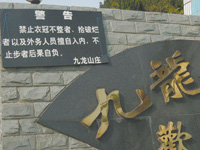
The infamous insulting sign of "Chinese and dogs are not allowed in," imposed by foreign invaders long ago on China's territory, is thankfully forever a thing of the past. Or so it was until an equally demeaning sign, this time posted by some snobbish Chinese, recklessly affronted the nation's harmonious society.
A striking notice reading "Migrant workers and recycled rubbish collectors are not allowed in" has been hanging above the gate of the Jiulong Lake scenery resort in east China's Zhejiang Province since May, stirring up strong criticism among the general public.
Claiming to be sticking up for the prestige of the resort, where high-ranking government officials and business moguls frequently pop in for relaxation, the scenery spot has shut its door since May to migrant workers and rubbish collectors that it views as "bad apples."
When asked about the standard used to restrict people, a gatekeeper surnamed Chen said he resort to clothes, saying, "I turn away anyone dressed in rags."
According to Mrs. Chen Hongxia, the secretary of the Jiulong Lake Hotel, which is embedded in the tourist resort, the move was initiated as the resort and hotel, which are subordinated to the local government, encountered several thefts that the staff blamed on migrant workers and rubbish collectors. However this has never been proved.
The Jiulong Lake Hotel, a three-star resort, is one of the key provincial scenery spots, added Chen, saying, "In effect the ban have enhanced the general quality and high-class image of the resort, with stealing cases having plummeted since the implementation."
"What if a rich person dresses like a migrant worker? Will he or she still be denied entry?" asked a local resident surnamed Wong. "It's totally ridiculous to set up such a ban and our migrant siblings are severely humiliated."
It's against the spirit of the law to discriminate against anyone, especially those hardworking migrant workers who are the dominant construction force for the nation's dynamic advancement, said Luo Jie, vice chairman of the Zhejiang Bar Association.
"It's typical of the 'status violence,' which indeed is a deterioration of civilization," added Luo. "Migrant workers, as legal citizens of the country, are granted by law the right to go anywhere in China."
Statistics show that in 2004, China had some 140 million migrant workers, accounting for more than 10 percent of the country's total population. Since it is expected that the size of this migrant population will continue to grow in the foreseeable future, the social problems experienced by these floating citizens will also pose a long-term challenge for the nation.
(Chinadaily.com.cn October 18, 2005)
|

